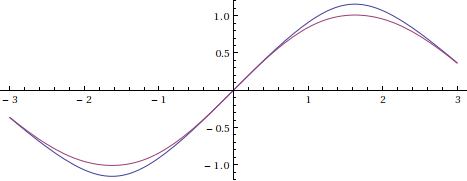The half-iterate of a function can be found by expressing its superfunction in a form of Newton series:
$$f^{[1/2]}(x)=\sum_{m=0}^{\infty} \binom {1/2}m \sum_{k=0}^m\binom mk(-1)^{m-k}f^{[k]}(x)$$
Where $f^{[k]}(x)$ means k-th iterate of $f(x)$ This series converges if two criteria are met:
The superfunction(flow) of f(x) grows not faster than an exponent
Runge phenomenon does not appear.
There is a number of strategies to combat Runge phenomenon which are outside of this answer's scope. It is worth noting though that trying to find a half iterate of the function $f(x)=\cos x$ leads to this Runge swamp and one needs to employ one of the mentioned techniques to acheve convergence.
Opposite case is with the function $f(x)=\sin x$. The superfunction is limited by $\pm 1$ and the series converges without any problem.
Below is a plot of half-iterate of $\sin x$, obtained with this formula. It is periodic with the same period as $\sin x$. The blue curve is the half-iterate, and the red curve is the half-iterate, repeated twice, and we can see that it is indeed very similar to sine function.

This plot is made from the first 50 terms of the above series.
This formula for the half-iterate can be used to find not only half-itertes but any real (or even complex!) iterate of a function by substituting the needed value instead of 1/2.
The formula can be also written in the following forms:
$$f^{[s]}(x)=\lim_{n\to\infty}\binom sn\sum_{k=0}^n\frac{s-n}{s-k}\binom nk(-1)^{n-k}f^{[k]}(x)$$
$$f^{[s]}(x)=\lim_{n\to\infty}\frac{\sum_{k=0}^{n} \frac{(-1)^k f^{[k]}(x)}{(s-k)k!(n-k)!}}{\sum_{k=0}^{n} \frac{(-1)^k }{(s-k) k!(n-k)!}}$$
There are also some other formulas giving the same result.
